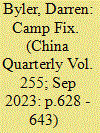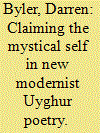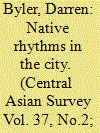| Srl | Item |
| 1 |
ID:
192624


|
|
|
|
|
| Summary/Abstract |
Industrial parks in north-west China occupy a liminal space between labour camps and private industry. Drawing on worker interviews, government documents, industry materials and images this article shows that for-profit public-private industrial parks have been built as part of a “camp fix” mechanism centred on detaining and “re-educating” Uyghurs and Kazakhs at the periphery of the nation. It argues that these industrial parks concentrate forms of repressive assistance and “dormitory labour regimes” that operate at other frontiers of Chinese state power and point these strategies of disempowerment towards a seemingly permanent, ethno-racialized underclass, producing a “re-education labour regime.” It further argues that the material infrastructures of these surveiled and policed spaces themselves are productive in enforcing the goals of the “camp fix”: the creation of high-quality, underpaid, docile and non-religious Muslim workers who are controlled through the built environment.
|
|
|
|
|
|
|
|
|
|
|
|
|
|
|
|
| 2 |
ID:
159371


|
|
|
|
|
| Summary/Abstract |
By recuperating the Sufi poetics of the Uyghur past, “avant-garde” Uyghur poets such as Tahir Hamut and Perhat Tursun are claiming a right to speak as heirs to both a religious and a literary tradition. For these modernist poets, finding one’s own way forward through the past is a way of reclaiming the discourse surrounding Uyghur identity, and the cultural symbols built into it, as an extension of the self. By channeling affect in such a way that it appears to derive from conventional Uyghur imagery, these poets demonstrate a measure of self-mastery that restores a feeling of existential security in the midst of political and religious change. This article argues that the purpose of their poems is to force the reader to accept new interpretations of images of Sufi embodiment and spirituality as valid and powerful. It further claims that the new indexing of Sufi imagery in this emerging corpus disrupts the unity of Uyghur poetry in the genres of Chinese Socialist Realism and ethno-nationalist Uyghur tradition, not in a negative process, but in order to create new forms of thought and subjectivity. It forces the reader to interpret the world not by trying to return to mythical Uyghur origins or reaching for a Socialist or an Islamic utopia but instead as a means of self-determination and affirming contemporary life itself.
|
|
|
|
|
|
|
|
|
|
|
|
|
|
|
|
| 3 |
ID:
159255


|
|
|
|
|
| Summary/Abstract |
Over the past two decades, state-directed Han settlement and capitalist development in the Uyghur homeland in Chinese Central Asia have uprooted thousands of Uyghurs, causing them to move to the city. In this article, I explore how low-income male Uyghur migrants and Uyghur culture producers build a durable existence despite these challenges. Based on analysis of migrant responses to the Uyghur-language urban fiction and indigenous music as well as ethnographic observations of Uyghur migrants from Southern Xinjiang, I argue that indigenous knowledge provides underemployed male Uyghurs a means to refuse the alienating effects of settler colonialism and economic development. By broadening the scope of what counts as ‘resistance’ to Chinese attempts to eliminate aspects of Uyghur society, I show that ‘refusal’ can be a generative way of embodying sovereignty, particularly when confronted by structural violence.
|
|
|
|
|
|
|
|
|
|
|
|
|
|
|
|